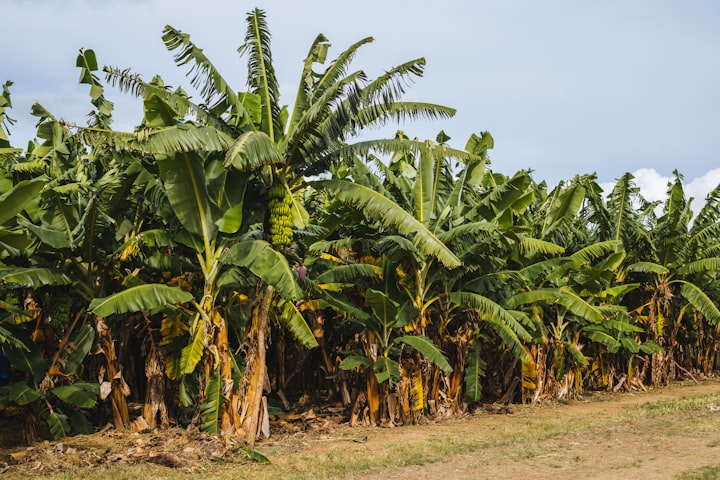
The banana tree, also known as Musa acuminata, is a tropical plant that is known for its delicious fruit and versatility. The banana tree is native to Southeast Asia and has been cultivated for thousands of years.
Nutritional Value: Bananas are a rich source of vitamins and minerals, particularly potassium and vitamin B6. They are also low in calories and are considered a healthy food choice. Eating bananas has been linked to a reduced risk of heart disease and high blood pressure, as well as improved digestion and weight management.
Culinary Uses: Bananas are a versatile fruit that can be eaten fresh, cooked, or processed into a variety of products such as banana bread, banana pancakes, and banana ice cream. They can also be used as a sweetener in baking and cooking and are a popular ingredient in smoothies.
Cultural Significance: Bananas have played an important role in many cultures and have been mentioned in literature, art, and mythology throughout history. They are often associated with good luck, prosperity and are considered a sacred fruit in many cultures.
Agriculture: Bananas are an important crop for farmers and are widely cultivated in many regions of the world, particularly in tropical and subtropical regions. They are relatively easy to care for, but are susceptible to pests and diseases. Banana plantations are an important source of income for many farmers and rural communities.
Landscaping: Banana trees are popular in landscaping and are often planted in residential and commercial areas. They are attractive plants that can provide shade and beauty.
Wildlife: Banana trees provide food and habitat for a wide range of wildlife, including birds, insects, and mammals. They are also an important food source for many species of wildlife in tropical regions.
Industrial Use: Banana plants are also used to make fibers, paper, and textiles. The banana stem and leaves can be used to make mats, baskets, and other products.
In conclusion, the banana tree is a valuable plant that has played an important role in human society for thousands of years. Its delicious fruit, nutritional value, and versatility in cooking are just a few reasons why the banana is such a valuable crop. Its ability to be grown in tropical and subtropical regions, its role in agriculture, and its role as a food source for wildlife are also noteworthy. The banana tree is a valuable asset for farmers, rural communities, and people all over the world. Not only is its fruit delicious and nutritious but also its cultural and industrial importance cannot be overlooked. It is a plant that has stood the test of time and will continue to be enjoyed by people for many years to come.
Oranges, also known as Citrus sinensis, are a popular citrus fruit that are known for their sweet and tangy flavor, as well as their nutritional value. Oranges have many uses, including:
Food: Oranges are a widely cultivated fruit that is known for their taste and nutritional value. The fruit can be eaten fresh, juiced, or processed into a variety of products such as marmalade and orange juice. Oranges are rich in vitamins and minerals, particularly vitamin C and dietary fiber, and are considered a healthy food choice.
Agriculture: Orange trees are an important crop for farmers and are widely cultivated in many regions of the world, particularly in subtropical and tropical regions. They are relatively easy to care for and are resistant to many pests and diseases. Orange orchards are an important source of income for many farmers and rural communities.
Medicine: Oranges have been used in traditional medicine for centuries. The fruit, leaves, and peel of the orange tree have been used to treat a variety of ailments, including colds, flu, and constipation. Orange oil, which is extracted from the peel, is also used as a natural remedy for skin conditions such as eczema and psoriasis.
Landscaping: Orange trees are popular in landscaping and are often planted in residential and commercial areas. They are attractive trees that can provide shade, beauty, and fruit for people to enjoy.
Wildlife: Orange trees provide food and habitat for a wide range of wildlife, including birds, insects, and mammals. They are also an important food source for many species of birds and mammals in the fall and winter when other food sources are scarce.
Juice production: Oranges are a key ingredient in the production of juice, which is a popular beverage worldwide.
Cooking and Baking: Oranges are a popular ingredient in cooking and baking, they can be used to make marmalades, jams, sauces, and other desserts. They can also be used to add flavor and texture to savory dishes as well.
Food Preservation: Oranges canalso be used for food preservation. The high acidity and Vitamin C content of oranges make them a natural preservative. Orange juice and zest can be used to preserve meats and fish, while orange marmalade can be used as a preservative for other fruits.
Beauty and Personal Care: Oranges have been used in beauty and personal care products for centuries. The oil extracted from orange peel is used in a variety of products, including perfumes, lotions, and soaps. The Vitamin C in oranges is also believed to have anti-aging properties and is commonly used in skin-care products.
In conclusion, oranges are a versatile and nutritious fruit that have many uses. They are a valuable crop for farmers and rural communities, and have been used for food, medicine, and beauty products for centuries. They also play an important role in the ecosystem, providing food and habitat for wildlife. The orange tree's ability to adapt to different climates and its many uses make it an important crop for people all over the world. With its delicious taste and nutritional value, oranges are sure to continue to be enjoyed for many years to come.





Comments
There are no comments for this story
Be the first to respond and start the conversation.